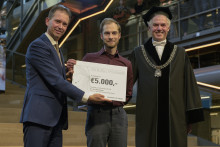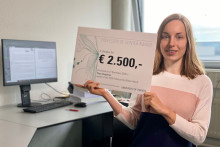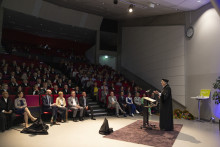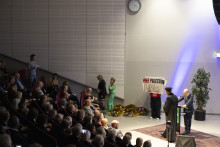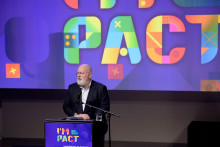Tom Kamperman did his PhD research at the Department of Developmental Bioengineering (TNW Faculty), where he now holds a postdoctoral position. His thesis ‘Microgel technology to advance modular tissue engineering’ describes a completely new approach for restoring the function of damaged or missing tissues.
The Overijssel PhD Award is the third prize Kamperman received for his thesis. He already won the award of the Netherlands' Society for Biophysics and Biomedical Engineering and the Julia Polak European doctorate award from the European Society of Biomaterials. However, the victory was still unexpected. ‘It is a big honor and a big surprise,’ says the scientist. ‘Especially because it’s a university wide prize, not one specific to my field.’
Overijssel PhD Award
The Overijssel PhD Award is annually awarded for a doctoral thesis of outstanding academic quality. Each UT faculty and research institute can nominate one dissertation. The prize is supported by the province of Overijssel and consists of €5,000 and a certificate.
Earlier this year, Kamperman also received the prestigious Rubicon Grant from NWO, which allows him to further his career at Harvard Medical school. The prize money of €5.000 will therefore come in handy, says the winner. ‘I’m leaving for Boston in January, but will need to keep my house here in Twente, so this money can help me cover the expenses.’
As a researcher and as a co-founder of a UT spin-off IamFluidics, Tom Kamperman continues to build on his PhD research. ‘In my thesis, I introduced a new concept for tissue engineering,’ he explains. ‘We were able to make tissue that closely mimics our native bodily tissue, especially in its structure. We developed biomaterials for the production of microgels that include cells and act as building blocks for complex tissue structures. We also came up with a new technique for upscaling the production of these microgels compatible with clinical and industrial applications. Within our start-up, we are aiming to commercialize this method.’


